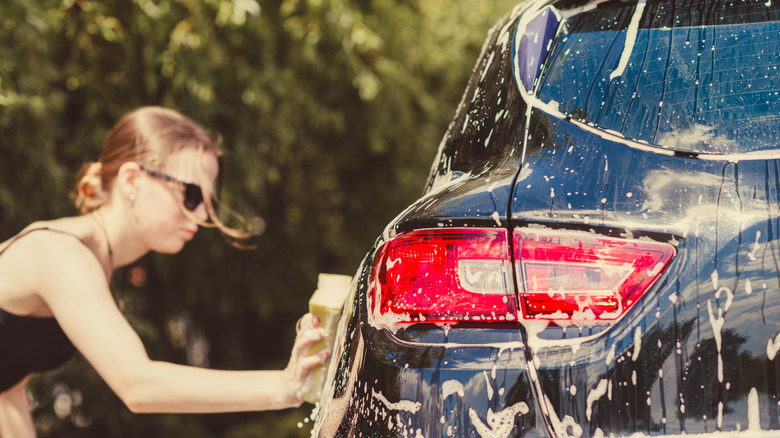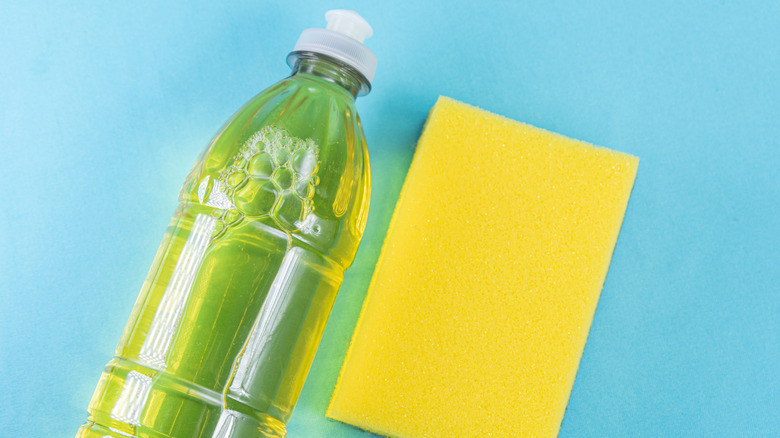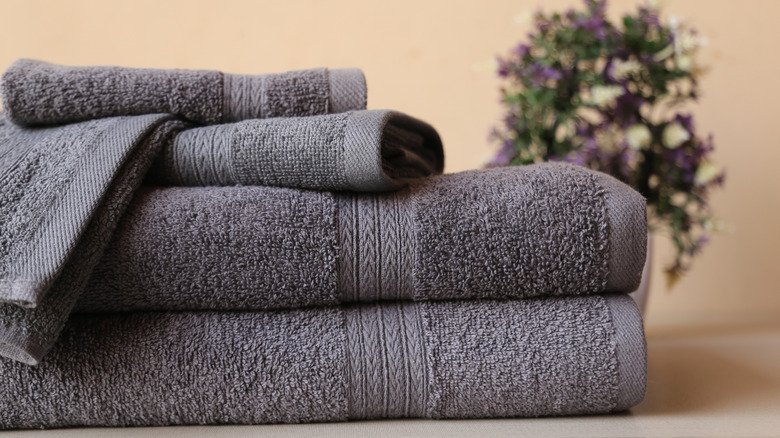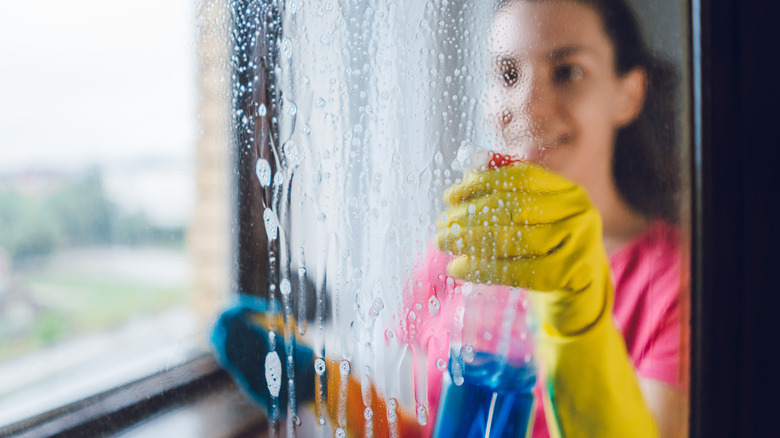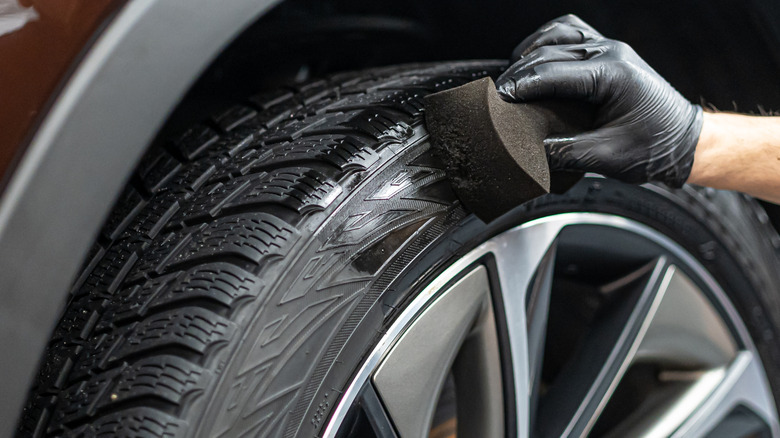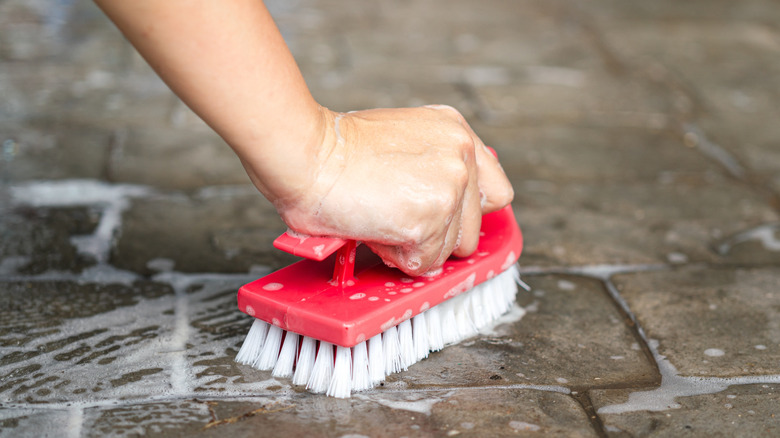5 Tools And Materials You Should Avoid When Washing Your Car
While there are plenty of car maintenance tasks best handled by the pros, one responsibility that we can always take into our own hands is keeping our car looking nice and clean. Sure, the inner workings of your vehicle should be your foremost concern, but keeping your car looking its best is not only a way to avoid being the laughingstock of the block, but is also an essential component in maintaining the longevity of your car.
Extremely dirty cars are less fuel efficient, more prone to corrosion, and have tires that are at a higher risk of being damaged. On top of this, your health and safety are also on the line, as messy windshields will greatly cut down on your visibility while driving and the buildup of allergens and bacteria can prove dangerous to your respiratory system.
But just because you can clean your car on your own doesn't mean that doing so is as simple as you might think. There's no shortage of frequent mistakes people often make while washing their cars, and among the most common of these errors is using the wrong products to do the job. Car cleaning is a somewhat scientific process, as the specific paints and protective coatings that make up your car react differently to certain chemicals and materials. As a result, it's important to take the time to consider what you're putting on your vehicle, which we're here to help you with today. Here are five materials you'll want to steer clear of when washing your car.
Dishwashing soap or detergent
It's easy to see how someone would be led to believe that the same cleaning product that was so effective at getting that tough lasagna stain off their plate would work equally well at washing their car. However, while dish soaps and detergents are certainly great at what they do, there's a reason they should stay in the kitchen.
The same chemicals that allow dish soaps and detergents to cut through grime so well can negatively affect your car's exterior. These products are often too harsh to the paints and protective coatings of your car and will eventually eat away at them. Stripping away your car's coatings won't only give it an unsightly appearance, but can leave it more exposed to the elements, resulting in further damage and corrosion. So as tempting as it might be to use these cleaning products given their affordability and convenience, this is something you'll want to avoid for the safety of your car.
Instead, use a good-quality car-specific soap to do the job. These items contain the proper chemical and pH levels to keep your car clean without the risk of stripping away any of its exterior elements.
Wash cloths and towels
While washing your car, you'll need something to wipe it down with, both while cleaning and to dry it off. Most homes come complete with items that are sufficient at these tasks such as towels, rags, and wash cloths. But for the purpose of cleaning your car, these items may not be as effective as you might think.
The issue with most rags and towels is that they are surprisingly harsh. Sure, they may not be harmful to use on your skin or items around your house, but the kinds of fibers that make up these items can prove abrasive on cars and cause unappealing scratches, marks, and swirls. On top of that, they're not even all that great at cleaning cars. Towels have especially bulky fibers that aren't great at absorbing the kinds of substances that commonly cover cars. You also risk making your car dirtier if you use a towel that contains dirt, debris, and grease trapped within its fibers.
Again, you'll want to use a product that is better equipped at interacting with and cleaning cars. In this case, a microfiber or chamois will be your best bet, as they are made of gentler material that won't leave marks on your vehicle while remaining absorbent enough to tightly contain moisture and debris.
House and glass cleaners
When it's time to go about your routine household cleaning, you likely have an arsenal of household cleaners that you use regularly to give your home the polish you desire. It's easy to imagine how useful they might be on your car in getting off stains or shining up your windows. Yet even if these products don't have the same function or viscosity as dishwashing soap, you're still likely to run into similar problems.
Like dishwashing soap, multi-surface and glass cleaners can leave the outside of your car worse for wear. The chemicals in these products lack the proper pH balance to work on cars, resulting in the stripping of your vehicle's important protective layers and leave it vulnerable to rust and further damage. However, even if they aren't appropriate for the outside of your car, you may be tempted to try out household cleaners on your ride's interior. Here you'll still want to be cautious. While certain glass cleaners may be helpful at getting rid of film from the inside of your windshield, other cleansers can potentially dull out or damage your car's seats, dashboard, and other upholstery elements depending on their materiality. Extremely harsh cleaners can also pose health risks to your skin and respiratory system.
Once again, using a car-specific cleanser will save you plenty of trouble in the long run. Whichever product you go with, it's a good idea to perform a spot test to get an idea of how your vehicle will react to it.
Solvent-based tire dressing
Along with the main body of your car, you'll also want to make sure that your tires receive plenty of TLC when it's time for a wash. But just as it's important to wax your car regularly, you'll likely want to give your tires a similar treatment. But before doing so, it's important to know that not all tire shining products are made equal.
Tire dressing is a specialized formula made to restore faded tires and give them back their dark coloration. For the most part, dressings are usually totally unnecessary additions to your tires. While many of these products claim to be good for UV protection, many experts contend they don't provide much benefit besides aesthetics. This may not seem like a big deal, until you find out that certain dressings have the potential to damage and harm your car.
Ironically enough, despite being advertised as something to shine up your tires, solvent-based dressings can potentially dry out and crack your tires, increasing the risk of it popping. If a solvent-based dressing spray bounces off your tire and gets on your car, it can stain the paint job. Even worse, sprays can cause damage to brakes if coming in contact with them and lead to brake damage. Oftentimes, using soap and water is more than enough to care for your tires.
Hard brushes
Being exposed to the outdoors regularly means your car is bound to come across plenty of nasty stains, some harder to remove than others. From water spots and bug stains to bird droppings and tree sap, you're bound to cross paths with at least one set of splotches that will take more than a little elbow grease to get taken out. While a hard brush may seem like the perfect tool to use for such a situation, you may end up doing your car more harm than good.
If we haven't made it abundantly clear by now, cars can get scratched up pretty easily. So the problem with most hard brushes, scouring pads, and similarly items should be pretty obvious — they can scratch up your car's paint job like nobody's business. Oftentimes, the bristles on these products, even some labeled for cars, are simply too rough and hard to work on car surfaces without leaving substantial scratching and swirling. Some bristles can potentially hold on to dirt and debris that can leave even more damage and mess than what you started out with.
Once more, this is a situation where you'll want to use car-safe products. A combination of a microfiber mitt or towel with a high-quality car cleanser will help remove tough stains while avoiding damage to your car.
